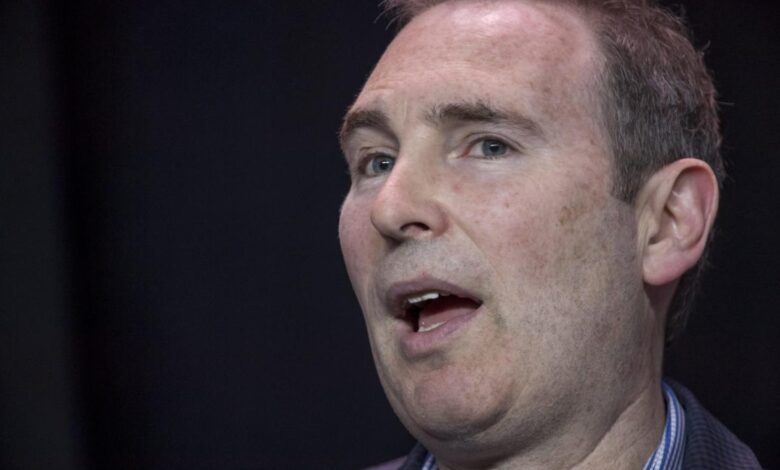Andy Jassy’s return-to-office mandate shows how serious the Amazon culture mid-life crisis has gotten

2024-09-17 02:26:52
For years, Amazon employees and executives have warned that the company’s unique corporate culture was starting to fray. The worries have crescendoed recently, as I reported in this deep Fortune investigation on the growing pains of Jeff Bezos’ famed leadership principles and management rules.
On Monday, Bezos successor Andy Jassy tacitly acknowledged this reality while proposing a pair of would-be silver bullets: a push to flatten the organization and reduce middle management layers and, most controversially, a five-day return-to-office mandate starting in January. Amazon has employed a hybrid work model in recent years, requiring in-office work three days a week since May of 2023.
“When we look back over the last five years, we continue to believe that the advantages of being together in the office are significant,” Jassy wrote. “I’ve previously explained these benefits, but in summary, we’ve observed that it’s easier for our teammates to learn, model, practice, and strengthen our culture; collaborating, brainstorming, and inventing are simpler and more effective; teaching and learning from one another are more seamless; and, teams tend to be better connected to one another.”
The shift to full-time in-office work marks a major shift for Amazon employees that will please some and undoubtedly drive others from the company, employees told me today. It will serve as a first for a majority of current Amazon corporate employees who’ve never worked in an Amazon office full-time, while for long-time corporate employees, it will be the first time since the pandemic began five years ago that they to work alongside their colleagues on a daily basis.
More face-to-face time will no doubt help rebuild some of those muscles. Amazon insiders have lamented the difficulty of learning the nuances of Amazon’s principles and practices during remote work.
The challenge for Jassy and his senior leadership team – or S-team – is that hybrid work is not the sole cause of the company’s endangered corporate culture.
The loss of longtime talent, including the high-profile departures of veterans like former Amazon consumer business CEOs Dave Clark in 2022 and Jeff Wilke in 2021, as well as Bezos’ departure from the CEO role that same year, has significantly diluted the company’s traditions, employees have said.
“Culture takes active architecture and work,” a former Amazon vice president who worked at the company for more than 15 years told Fortune earlier this year. “There was nobody else left to teach [that],” the former exec added, in a nod to all the top leaders who have left the company.
Expect some push-back
Jassy & Co. also face a reality that many employees already believed that the original three-day return-to-work mandate severed trust between leadership and the rank-and-file when it was instituted last year. At the time, more than 30,000 Amazon employees joined an internal Slack channel to discuss opposition to that move, with some helping to create a six-page memo — a prototypical Amazon document format — to lay out their concerns. Today, anger is a common emotion among those I’ve spoken with.
Still others pointed to the addition of two new Leadership Principles in 2021 — “Strive to be Earth’s best employer” and “Success and scale bring broad responsibility” — as a turning point for how vague many employees thought the new rules, and how they diluted the other principles that came before them.
“They are clearly a marketing ploy and they devalue the rest of the Leadership Principles,” one former senior manager of more than 10 years who left the company recently told Fortune earlier this year. “Total bullshit,” was how a former longtime communications employee at Amazon who was still at the company at the time summed them up, saying the new maxims were “playing the reputational game versus guiding how you think.”
Again, today’s announcement won’t cure any of this. If anything, employees who spoke to Fortune on Monday expressed a belief that the new mandate actively goes against the idea of a “best employer.”
All of that said, there is another component of Jassy’s announcement that the CEO hopes will revitalize some of the deficiencies in the corporate culture.
“[W]e’re asking each…organization to increase the ratio of individual contributors to managers by at least 15% by the end of Q1 2025,” Jassy wrote. “Having fewer managers will remove layers and flatten organizations more than they are today. If we do this work well, it will increase our teammates’ ability to move fast, clarify and invigorate their sense of ownership, drive decision-making closer to the front lines where it most impacts customers (and the business), decrease bureaucracy, and strengthen our organizations’ ability to make customers’ lives better and easier every day.”
In recent years, many company employees have told me that middle management became bloated as hiring dramatically increased between 2019 and 2021. Even with the layoffs of tens of thousands of corporate employees under Jassy, the problem festered, employees have told Fortune. During those intense hiring cycles, thousands of managers and executives not steeped in the Amazon Way joined the company.
It remains to be seen whether Amazon’s purge of middle managers, via the new manager-contributor ratios, increase its decision-making and innovation metabolism. The unintended consequences of such a move will also be worth watching.
Either way, Jassy is making a calculated bet that a controversial kick in the pants will recharge Amazon’s cherished culture. But the risks are very real.
Are you a current or former Amazon employee with thoughts on this topic or a tip to share? Contact Jason Del Rey at [email protected], [email protected], or through secure messaging app Signal at 917-655-4267. You can also message him on LinkedIn or at @delrey on X.
This story was originally featured on Fortune.com
